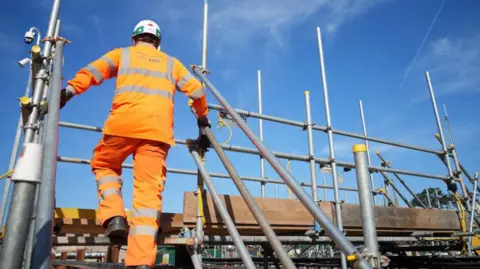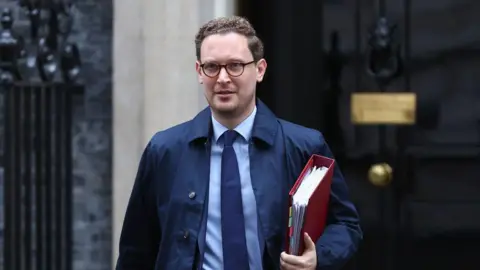 getty images
getty imagesThe Treasury has given its clear signal yet again that it will change its self-imposed borrowing rules to borrow billions to finance new infrastructure projects.
Treasury Chief Secretary Darren Jones has said an independent inquiry will be launched into spending for major construction works to allow the government to borrow “more efficiently” for investment.
He claimed the safeguards on spending would aim to avoid a repeat of the fiscal turmoil that followed the 2022 mini-budget under former Prime Minister Liz Truss.
The new watchdog will oversee a 10-year strategy for a pipeline of major projects in sectors such as buildings, roads and rail.
What the government is calling a “railway” for infrastructure spending will be part of its aim to encourage the private sector to invest in British projects.
Under the scheme, “expert-led checks and balances” will determine the quality of government borrowing for investment.
At present, the amount of money the government can borrow for investment is limited by the amount of debt it has.
There is a self-established rule that the debt – the total amount owed by the government – must be reduced in five years’ time.
Many rich countries have similar rules in place to keep government finances under control and maintain credibility in financial markets and among taxpayers.
But the Treasury has effectively confirmed it will relax its target of borrowing billions of dollars to invest in a number of major projects.
Before the budget on 30 October, Jones said that “railroads” on spending would allow the government to “move forward more efficiently” to borrow for investment.
He said these guardrail trusses were contrary to the government’s “borrowing for unfunded policies”.
During his brief premiership in 2022, Truss used his “mini-budget” to unveil £45 billion in non-funded tax cuts in an effort to boost economic growth.
Jones said: “We need expert, institutional and some independent guardrails to make sure everyone has confidence in the way the government is spending taxpayers’ money.
“I am confirming today that we have put them in place for capital investment and infrastructure delivery.”
The changes will include a new National Infrastructure and Services Transformation Authority to oversee a 10-year strategy for a pipeline of major projects, which will align with a series of spending reviews, and for example, for investment in buildings, roads Long term budget and railways.
The National Audit Office and a new Office for Value for Money will also offer ongoing assessment of “mega projects” such as major rail lines.
The government said the move would “de-politicize” infrastructure decisions and offer “independent checks and balances” against the government, similar to the Office of Budget Responsibility.
 getty images
getty imagesThe government views this system as providing an independent quality control over the spending of major projects, which has been plagued by delays and overspending, and has proven more expensive in the UK than in other major economies.
Ministers argue that current debt rules have led to the poor quality of UK public services by inhibiting some much-needed investment, and also allowing spending on failing projects.
A cabinet minister told the BBC: “When we invest in projects we will make sure they provide real value for money, they bring a return on investment and they work for communities.
“The Conservatives wasted billions of pounds of taxpayers’ money on ministerial projects that were never delivered in an attempt to buy votes. The Budget will be about changing that.”
The announcement comes as the government faces scrutiny over the way it spent the money in the budget due at the end of October.
on wednesday, Ministers wrote a letter to the Prime Minister asking him to reconsider the expenditure review. He is worried that this will lead to cuts in his own department’s budget.
Those reportedly concerned include Deputy Prime Minister Angela Rayner, Justice Secretary Shabana Mahmood and Transport Secretary Louise Haigh.
Jones’ comments come as the government launches a “taskforce” for infrastructure spending – a group of private sector bosses including HSBC, Lloyds and M&G – which will advise the government on where to invest for infrastructure. .
Chancellor Rachel Reeves said, “Increasing investment in infrastructure is a vital part of delivering our number one mission to grow the economy and create jobs.”
The government has said that its top priority is to boost growth in the UK economy, and Chancellor Rachel Reeves said that increasing investment in infrastructure was a “key part” of achieving this.
Prime Minister on Monday… Sir Keir Starmer hosts a major investment summit Attempting to attract billions of pounds from international investors to Britain.
He said at the summit that he would eliminate regulation that “stifles investment” and ask regulators to prioritize economic growth.
